 By Hubery Editer
By Hubery Editer
Abstract: Everything has two sides. So dose fly ash. Waste fly ash pollutes the environment and does harm to living creatures; while recycled fly ash reduces environmental pollution, save occupied area and is used in industrial production, which has a prolong meaning to the realization of sustainable development.
This paper will show you a brief introduction to fly ash value and how to choose a suitable fly ash dryer to turn waste fly ash into treasure and create added value.
Fly ash is also called pulverized fuel ash in the United Kingdom. It is fines that are collected from smoke of burning coal. It is the main solid waste from thermal power plants, which is also the main source of fly ash.
To improve the burning efficiency of coal, thermal power plant does not burn the whole block of coal but burn the pulverized coal powder. There is a large amount of incombustible matters in the pulverized coal powder. With the effect of high-temperature, they are fused and blown out by the induced draft fan and then are collected by the dust collector. Then we go to get the fly ash.
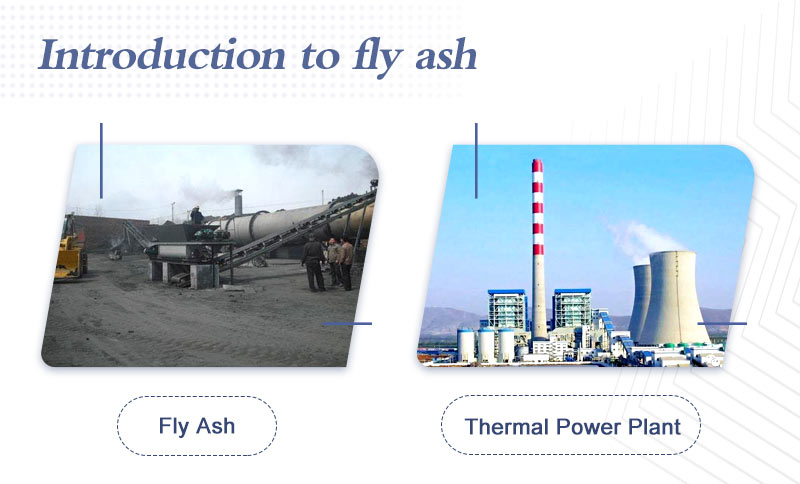
Fly Ash Main Source
With the development of coal-fired power stations, more and more fly ash is produced in the world. Based on the report, there are over 65% of fly ash are discarded to the waste filler plants and soot pools.
Besides, there still are citizens burning coal for cooking and heating producing lots of fly ash cannot be collected. Therefore, everyone will surely be shocked by the amount of fly ash every year.
What's worse, every wasted fly ash will do harm back to the features including human beings. Fly ash composes of many hyper toxic microelements, such as arsenic, cadmium, lead and mercury, etc. The fly ash discarded at will causes countless examples of water pollution, creature pollution. In 2008, Tennessee Valley Authority in America was annoyed by fly ash leakage and the disposal cost was up to 1.2 billion USD.
Although waste fly ash has so many disadvantages, collected fly ash can be used to increase added value. It was commonly used in garbage landfilling, roadbed, soil disposal, etc. While right now, dried fly ash can be newly used in the production of cement, concrete, mortar, ACC blocks and other building materials.
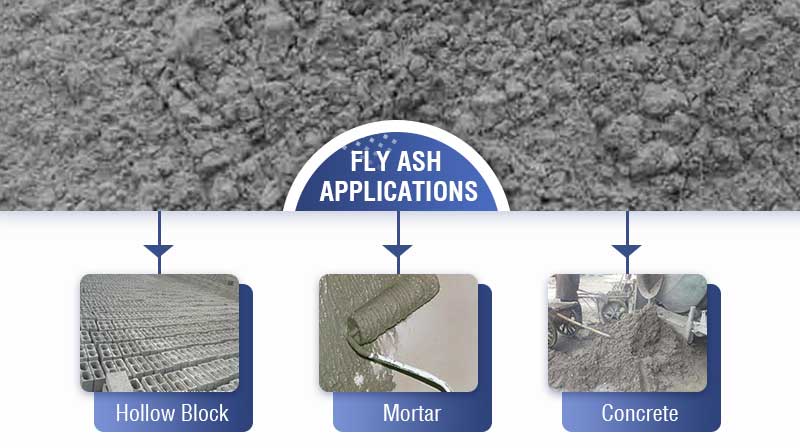
Fly Ash Application
Pull one field of global development and the whole development is affected. Currently, each country feels the benefits brought by infrastructure and enlarges the investment, which causes an increasing building materials demand like cement and concrete.
Because that it is produced from coal burning, fly ash contains lots of silica oxide, aluminum oxide, and the main mineral compound, calcium oxide in calcium-bearing rock formations.
The amount of the unburned charcoal powder in fly ash primarily affects the quality of fly ash and its application. Currently, fly ash is mainly applied in construction and building material production, which accounts for about 70% of its total uses. Besides, it is also widely utilized in agriculture, environmental issues, road building and landfill in an industrial project, etc.
There are two solid waste when coal burning, ash and slag. Except for the particle of fly ash, there is another kind of waste which is bigger usually being in the form of blocks exhausted out from the boiler bottom. This kind of wasted can also be used in the production and manufacturing of cement and concrete.
1. Improve the Workability
Adding suitable amount of fly ash can improve the performance of cement and concrete, especially the concrete. It is to improve the fluidity, cohesiveness, and the ability to keep water. This makes it easier to pump, which reduces the economic loss of caving.
2. Reduce the Hydration Heat
Fly ash has a low hydration heat. It means that rifts caused by increasing temperature. Especially, large-volume project gets benefits from it.
3. Lower Material Cost
At the same strength, fly ash can reduce about 10% cement in concrete making.
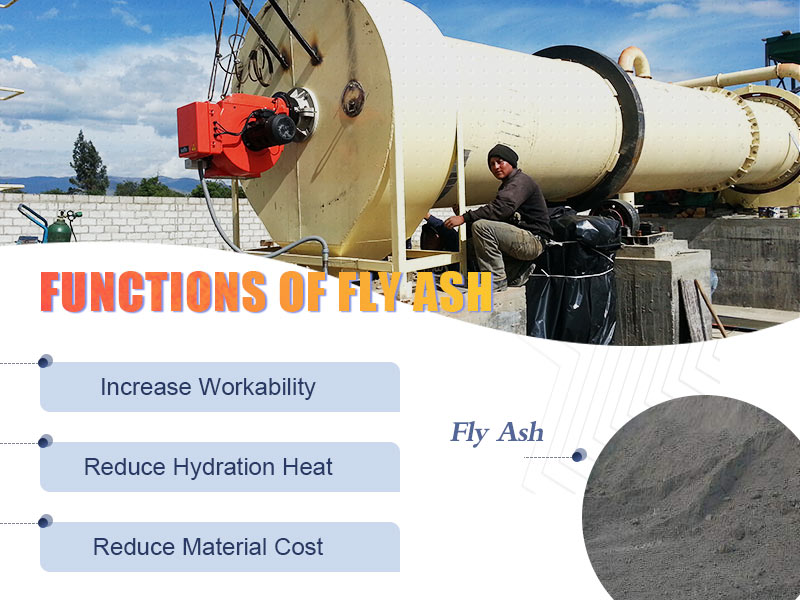
Fly Ash Benefits
Thermal power plants have different coals as the resource, making a different quality of collected fly ash in different area. Some even seldom get 45% sometimes. Over moisture influences the activity of fly ash.
Therefore, drying equipment is needed to decrease the moisture of fly ash. At present, the mostly used machine to dewater the wet fly ash is fly ash dryer.
As mentioned, fly ash dryer machine is the mostly used in fly ash dewatering. Each model of fly ash dryer machine can be used in different fields to process different materials. Before talking about the fly ash dryer machine selection, here introduces two main fields.
Cement and concrete production adopts a low-cost method of less clinker, more micro powder, which can consume fly ash and other industrial waste in thermal power plant, metallurgy, coal, etc. to a maximum content. With a suitable match with the additive of fly ash and other materials, the concrete compactness is improved and so as the concrete service life.
Low-price fly ash is used in making low-cost and high- performance cement and concrete, for which the cement and concrete is also environmentally friendly. Therefore, fly ash has been an important material in the building material production transition.
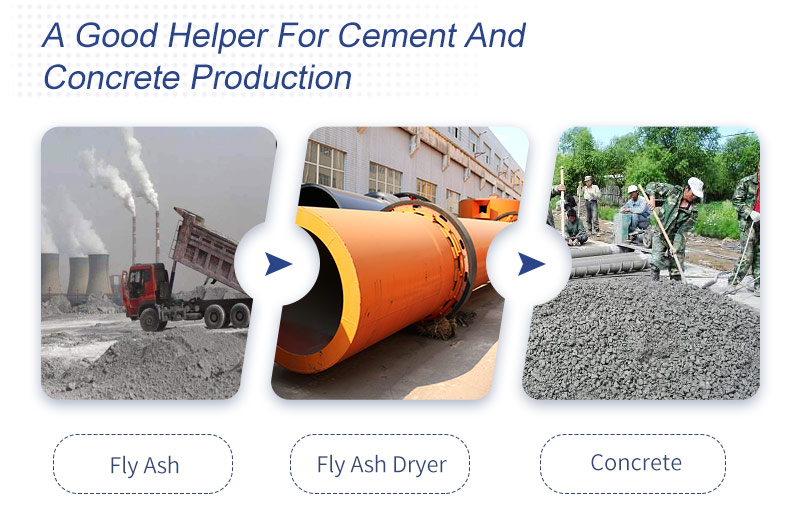
Fly Ash in Cement and Concrete
Thermal power plants are the main source of fly ash. As reported, only one common thermal power plant in can produce over 15 million tons of usable fly ash. So recycling waste fly ash from its source can save a large amount of time, labor and cost.
Applying fly ash drum dryer in thermal power plant makes it easy to obtain fly ash. Transportation of both wet and dry fly ash is economical and there is no need for extra stock yard. This application can not only narrow the reuse circle but also create extra value for the thermal power plant and improve the incomes.
Principle
Fly ash rotary drum dryer is a rotary dehydration device.
As the key equipment in fly ash treatment process, fly ash rotary drum dryer is mainly used to dehydrate by heat exchange between hot air and materials. The drying cylinder shall be placed at a certain inclined Angle. The driving device rotates the cylinder evenly.
The material enters from the feed port and moves towards the discharge port with the rotation of the drying cylinder. In this process, heat exchange is realized.
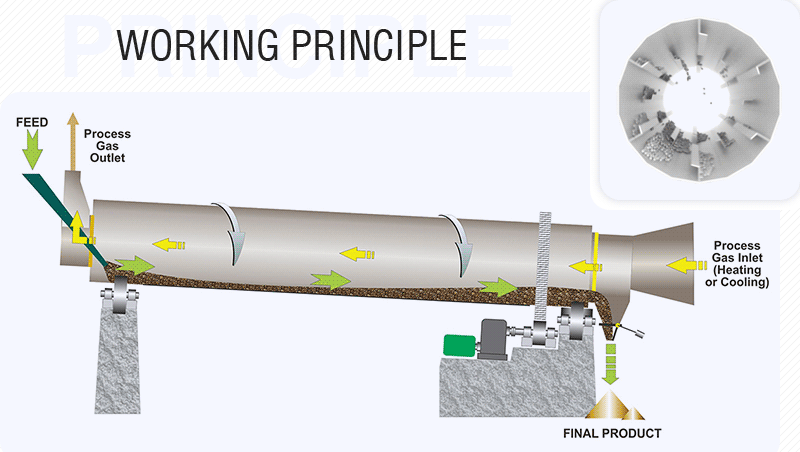
Working Principle of Fly Ash Dryer
Advantages of Fly Ash Drum Dryer
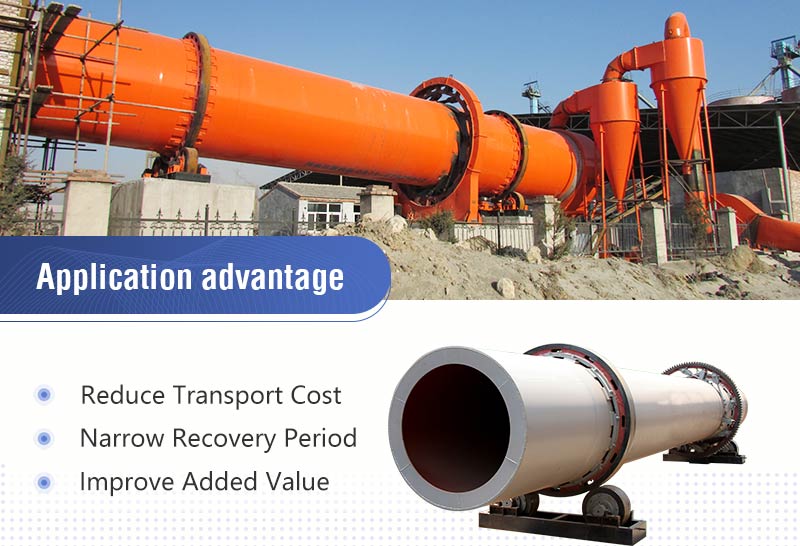
Advantages of Fly Ash Rotary Dryer
Wide Fuel Selections
√ Coal
√ Oil
√ Gas
√ Other kind of fuels
There are four key factors that affect the choice of dryer model: output, feed humidity, feed humidity and material type.
1. Material
Fly ash dryer is mainly aimed at the light quality of fly ash, reducing the strength of the blower and reducing the blockage of wet materials on the drying cylinder.
However, different types of fly ash dryer correspond to different properties of fly ash.
Investors should understand their own needs, investigate the specifications required for fly ash drying, consult professional engineers of the manufacturer, and determine that the fly ash dryer is applicable to the materials of the company.
2. Feed Humidity and Discharge Humidity
For different fly ash, water content is also different, one should choose different models accordingly.
After consulting professional engineers, investors had better choose the equipment with high drying efficiency and fuel saving, which can effectively reduce the production cost.
The reason for choosing different types of fly ash dryers for different discharge humidity is the same, which is to improve drying efficiency and reduce fuel cost.
3. Production
In addition to abnormal factors such as feeding uniformity and air volume of induced draft fan, the important factors that affect the output are the volume of drying cylinder, feeding plate device and rotating speed.
Under standard conditions, the length of the drying cylinder is 10 times the diameter. But this standard is variable, manufacturer can adjust length according to investor's project demand commonly. According to customer requirements, the Angle of the material plate can also be in 90°, 135°, 150°.
| Specification (Dia. x Length) | Capacity (TPH) | Main Motor (KW) |
| Φ1.2x8-Φ1.2x10 | 1.9-3 | 7.5 |
| Φ1.5x12-Φ1.5x15 | 4.5-7.1 | 15 |
| Φ1.8x12-Φ1.8x14 | 6.5-9.5 | 18.5 |
| Φ2.2x12-Φ2.2x16 | 9.7-16.2 | 22 |
| Φ2.4x14-Φ2.4x22 | 13.5-26.5 | 37-45 |
| Φ2.6x24-Φ3.6x28 | 27.2-76 | 55-160 |
Partial models of Fote fly ash dryer. For more customized solutions, please consult online engineers for fly ash dryer quotation.
Other Factors Affecting the Selection
◆ Preferred fuel and motor power
The dehydration of dryer is mainly completed by heating materials and electric support. Because the dryer structure is simple, the late maintenance cost is lower. The cost of fuel and the cost of electricity are the major investments in addition to the initial investment in machinery.
◆ Working environment
Fly ash dryers investors can send photos of the drying site and other details to engineers when they contact them. The engineer will take the size of the site as a factor in choosing the right ash dryer for you.
◆ Budget
Funding is also an important factor for engineers and investors to consider when selecting fly ash dryers.
In fact, after providing relevant project requirements, fly ash dryer manufacturers will generally customize fly ash dryer or drying production line for investors according to their needs.
Taking fote fly ash drying line in India as an example, this paper briefly analyzes the selection of fly ash dryer and its application in cement production line.
Mr. Sanjay of Bombay collects large amounts of fly ash from local coal-fired and thermal power plants and uses it as raw material for his cement plant.
He learned that fly ash can improve the performance of cement in cement production, so he invested in the reuse of fly ash, hoping to get good benefits through low raw material cost.
In the process of treatment, fly ash dewatering becomes a big problem. He found our website on the Internet. After he sent the requirements of capacity, feed moisture, discharge moisture, etc., our engineers provided him with a most suitable production line.
After several communications, Mr. Sanjay introduced a fly ash drying line from Fote Machinery. Here are the details of the drying line.
Pocessed material: Fly Ash
Feed humidity: about 40%
Discharge humidity: 3-4%
Processing capacity: 25TPH
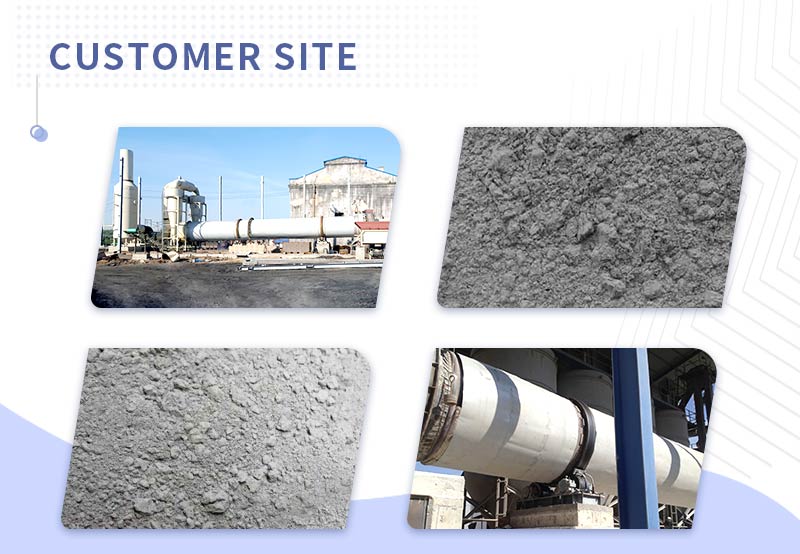
Fote Fly Ash Drum Dryer Customer Site
● The recovered fly ash should be screened the dry from the wet and then be dried.
● When a fly ash dryer works, wet fly ash shall be fed evenly, which is good to improve drying efficiency and save fuel cost.
● Separately treat fly ash with different sizes of lumps and particles because of the different thermal contact area to avoid uneven drying.
With more and more countries paying attention to green development, the recycling and utilization of fly ash is likely to form an industrial chain with coal burning in thermal power plants and cement and concrete manufacturing.
It can not only save resources and protect the environment, but also helps to find alternative resources of expensive raw materials such as clay, and improve the income of the whole building materials industry.
Fly ash dryer will play an increasingly important role in facilitating the storage and transportation of drying fly ash. Investment in fly ash dryers may provide your plant with an excellent source of ancillary profits.
Data Main Source:
[1] https://en.wikipedia.org/wiki/Fly_ash
[2. Chinese Version] https://zhuanlan.zhihu.com/p/44633323
 Online Chat
Online Chat